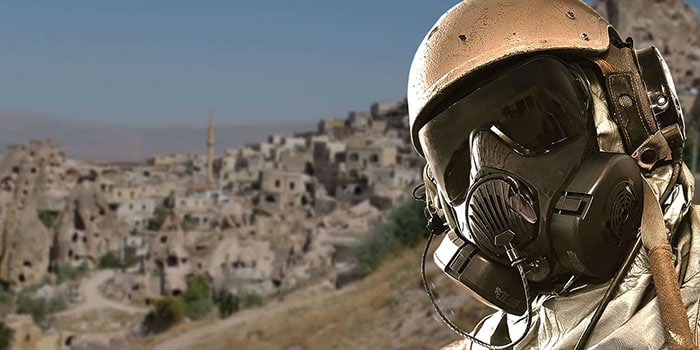What are Respirators?
Respirators are a form of personal protective equipment that provide respiratory protection against airborne contaminants. Respirators can either filter the ambient air or provide clean breathing air in the case of Self-Contained Breathing Apparatus (SCBA) systems.


What is Respirator Fit Testing?
A respirator fit test consists of several exercises designed to stress the respirator/face seal during which the test subject wears the respirator to be tested, and the ratio of the challenge agent concentration inside the mask to the ambient concentration is measured. This Ratio is the Fit Factor. In the CNC method, ambient ultra-fine particulates are the challenge agent.
Respirator Fit Testing Requirements
OSHA requires that respirator fit testing be done on tight-fitting respirators. If the respirator does not rely on a tight seal around the face (i.e., PAPRs), it does not require testing. Tight-fitting respirators including Filtering Facepieces such as N95 masks require either qualitative or quantitative fit testing. Full Face respirators must be tested with a quantitative method because the minimum Fit Factor required for a Full Face respirator is 500, which is not achievable with qualitative methods.


Fit Testing Frequency
Respirator fit testing must be done prior to using a mask on the job. The fit test is valid for one year unless there are any major changes to the face of the user. This may include major dental work, facial scarring, a visible change in weight or facial surgery. The fit test is only valid for the particular make, model, and size of the respirator tested.
Qualitative vs Quantitative Fit Testing
Quantitative Fit Testing
- Completely objective data-backed test
- Defensible Metrics
A Quantitative Fit Test uses fit testing equipment to measure the leakage around the face seal of the respirator mask to give a “fit factor”. A minimum fit factor of 100 is required for half-mask respirators and a minimum fit factor of 500 for a full-facepiece respirator. An important consideration is the fact that a quantitative fit test does not rely on the test subject’s ability to sense the challenge agent or his or her truthfulness.
Qualitative Fit Testing
- Completely subjective data-backed test
- No Defensible Metrics
Completely subjective test with no defensible metrics.
A qualitative fit test relies on both the test subject’s ability to sense the challenge agent and his or her truthfulness in reporting whether or not the challenge agent is sensed. Cannot be used for full-face respirators.
It is essentially a pass/fail test that measures a subject’s ability to detect any leakage of gas challenge agent into the respirator based on taste, smell, or reaction to an irritant by the user. Due to the fairly large differences in a person’s ability to sense these challenge agents, the accuracy of the test is extremely low.
Quantitative Fit Testing Equipment
Cutting-edge respirator fit testing machines can help to save lives with the most accurate testing possible.
Designed with all respirator users in mind, the AccuFIT9000 and AccuFIT9000 Pro are ideal solutions for industrial, first responder, and healthcare respirator users who are looking for one product that can address all of their fit testing needs affordably.
Respirator fit must be tested annually, and must be re-tested if there are any changes in the physical appearance and/or structure of the face.

Respirator Fit Testing FAQ
An Ambient Aerosol Concentration (AAC) Condensation Nuclei Counting (CNC) fit test consists of several exercises during which the test subject wears the respirator to be tested, and the ratio of the particulate concentration inside the mask to the ambient concentration is measured.
These exercises are designed to stress the face-to-respirator seal. Please refer to 29 CFR 1910.134 for a complete description of the fit test protocol.
There are a number of contractors who provide fit testing on a contract basis. If you would like to ask us for information regarding these contractors please use our contact form.
The fit test is good for one year for the particular person and respirator brand and model tested.
29 CFR 1910.134 is very unambiguous here – clean-shaven respirator seal area is mandatory. The onus is placed on the person administering the test to ensure that this is observed. The regulation goes even further; it is mandatory that the person must also be clean-shaven while wearing the respirator in the performance of the work duties.
Typical charges for a fit test range from $30-50. We can provide a spreadsheet that you can use to calculate cost/benefit of contract to in house fit testing.
Respirator Fit Testing Resources
Common Workplaces Which Require Respirator Fit Testing
Respirators are used in variety of fields and disciplines. Fit testing requirements may vary between industry by frequency of testing or specified testing methods.
Chemical Industry
Interacting with chemicals on a daily basis can be dangerous. And while you may take many health and safety precautions, there’s always a chance that the wrong chemical interaction could have massive consequences.
Military
Our military personnel face all types of hazardous materials and the respirator is made to protect them from chemical and biological agents, along with radiological fallout particles, and many other various potentially harmful inhalants.
Healthcare & Medical
Healthcare personnel can be exposed to diseases transmitted when infectious agents are suspended as aerosols or present in particles or droplets. In such cases, respirators should be used and need to be tested.
First Responders
The dangers that first responders and firefighters face vary greatly but include explosions, fire, falling debris, and many more. The contaminants in air can cause pulmonary damage to individuals who do not have a properly-fitted respirator.
Oil & Gas Industry
Gas workers are vital to keeping the world running. Natural gas and other gas involved industries keep us and our cars, houses and machines on the go. So, if you need guaranteed safety when working with gas, the AccuFit Quantitative Fit Testing line is perfect for you.




